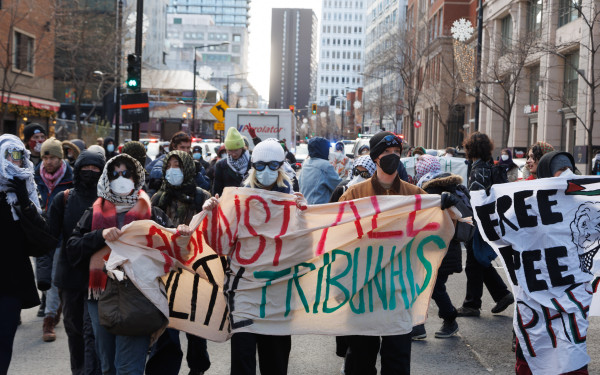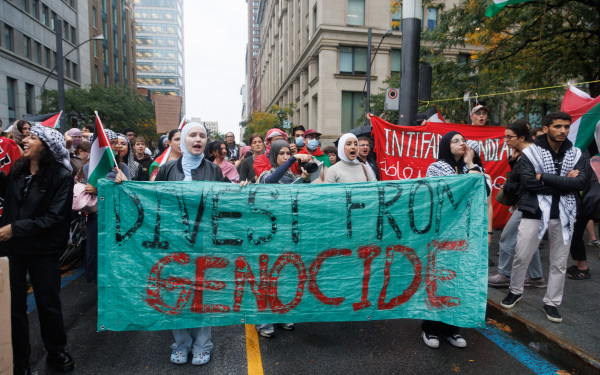Student associations lead efforts on day two of strikes
Classroom outreach and protests marked the second day of student action at Concordia
On Nov. 22, a second day of student strike action in solidarity with Palestine took place at Concordia University.
The Loyola Campus saw quieter activity than the Sir George Williams (SGW) campus's rallies downtown, with only the psychology and communications departments striking at Loyola. Despite the slower pace, student associations like the Concordia Undergraduate Psychology Association (CUPA) made efforts to engage students and maintain a visible presence.
CUPA VP of internal affairs Valérie Brunelle explained that the association shifted its approach to focus on educational class announcements and one-on-one interactions. This decision stemmed from logistical challenges, including a lack of volunteers at Loyola, and an email from Concordia sent on Nov. 19, two days before the strike, urging peaceful demonstrations and renouncing violence.
This prompted CUPA to adopt a strategy centred on educational outreach. Banner-making, as well as flyers and pamphlets, were made available at the student hub on the second floor of the Communication Studies and Journalism (CJ) Building.
Brunelle noted that the lack of participation might stem from students not fully understanding the strike and the importance of respecting picket lines or ways to support the cause, such as their right to ask professors for accommodations.
Brunelle also explained that CUPA’s efforts to address this were hindered when the administration failed to follow through on an email they said they would send to all undergraduate psychology students, leading organizers to find alternative channels to spread the word on the strike.
Brunelle stated that faculty and administration resistance further complicated efforts. Some professors allegedly did not allow student announcements, with some discouraging students from participating in strike activities, while others refused to cancel or adapt classes.
Brunelle also described incidents where Campus Safety and Prevention Services (CSPS) officers allegedly removed banners the night before the second day of the strike, as they were not allowing banners to be on display overnight, or claimed that volunteers were disrupting student spaces while preparing for the strike.
“They gave [the banner] back, but having to plead with them on their terms is quite frustrating," Brunelle said regarding CSPS officers’ actions. "Especially when, personally, I see the double standard compared to tuition strikes, where they were much more lenient. Now that it’s pro-Palestinian, they’re being far more controlling, enforcing even the smallest rules.”
While strike volunteer turnout was lower at Loyola on Nov. 22, many students stopped by the student hub to collect pamphlets and ask questions about the plans for the strike.
Brunelle emphasized that these interactions helped bridge gaps in understanding and encouraged greater involvement in student democracy.
“We hope this shows the administration and students alike that ‘business as usual’ cannot continue when crises like this are unfolding globally,” she said.
At the downtown SGW campus, nine student associations were striking.
According to a Coalition of Resistance for Student Union Unity representative, frustration with being ignored at multiple levels—university, provincial and federal—has fuelled the growing movement.
“This is the biggest student strike in Quebec since the austerity protests of 2015,” said the representative, who was given anonymity due to privacy concerns. “Striking is always a last resort. It’s stressful for everyone involved, and it’s unfortunate that it has come to this to get those in power to listen to us.”
The representative also highlighted security concerns, particularly for those visibly associated with pro-Palestine activism.
“I think there’s a lot more concerns—personal security concerns, like putting my face associated with pro-Palestinian activism,” they said. “And there’s also just general concern for everybody that is choosing to involve themselves with the strike.”
According to Students for Palestine’s Honour and Resistance (SPHR), an incident at SGW further escalated tension when a pro-Palestine protester was shoved by a student in front of security and Acting Dean of Students Katie Broad. Footage shared on social media shows CSPS intervening physically with pro-Palestine protesters.
In response to questions about CSPS’s preparation for the strike, Concordia spokesperson Vannina Maestracci said in an email: “CSPS agents have been trained in de-escalation and arrests are only made when criminal acts take place, which unfortunately has happened in prior protests.”
However, past incidents have raised questions about CSPS’s handling of students and their use of force during non-violent situations.
Protesters at SGW emphasized that the strike’s message extends beyond Concordia, linking it to broader issues, with many also attending a protest against the North Atlantic Treaty Organization (NATO) parliamentary assembly’s presence in Montreal—happening that same day downtown—as part of the strike’s activities.
“NATO has made a lot of people very mad right now because, specifically here in Canada, the government has agreed to increase military spending to 2 per cent, which is not an insignificant amount of money,” the strike representative said. “We don’t want our money going to foreign wars or just wars in general.”
Despite challenges, both campuses reinforced the call for more strikes and disruptions if demands are not met.







